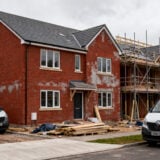This Thursday’s Scottish Budget needs to take action to help homebuyers according to a leading property firm. DJ Alexander Ltd, which is the largest lettings and estate agency in Scotland and is part of the Lomond Group, said that the Scottish Government had an opportunity to support homebuyers by establishing a fairer, more equitable tax on homebuying in Scotland. At present the Land and Buildings Transaction Tax (LBTT) disproportionately charges a small number of buyers in Scotland much greater taxes compared to those in England.
Worryingly, the Scottish property and personal tax system is increasingly dependent on a small number of individuals to provide the bulk of income. Last month just 1,910 homebuyers paid 84.3% of all tax (excluding additional dwelling supplement (ADS)) totalling £42.3m out of a total of £50.2m collected.
Equally, the personal tax system in Scotland is similarly dependent on a very small number of people paying a disproportionately large contribution to revenues. During 2020 to 2021 despite there being only a small proportion (14.8%) of Scottish taxpayers who were higher or top rate taxpayers, they were liable for 59.8% of all income tax in Scotland.
The latest figures also show that this higher level of taxation may be impacting on the number of wealthier people who choose to live in Scotland as there were 700 fewer top rate taxpayers in the 2020 to 2021 period. With an estimated 20,000 people in Scotland who are above the £150,000 threshold for additional rate tax this represents a 3.5% drop in the total number of wealthy contributors.
The risk is that the combination of the growing disparity of property and personal taxes could lead to more individuals and families deciding to leave Scotland because of the onerous financial burden of working and living in Scotland.
David Alexander, the chief executive officer of DJ Alexander Scotland, commented: “This week’s Scottish budget needs to cover a lot of ground without disproportionately targeting one group over another. Politicians always talk of fairness, and that those with the broadest shoulders should bear the greatest burden, but we can see that taxes in Scotland increasingly target those who would not traditionally be regarded as wealthy.”
“In the property market first time buyers are punitively charged at a much earlier level than their English counterparts. Tax starts at £175,000 compared to £425,000 in England and Wales. Equally the higher rate of property tax is charged from £325,001 in Scotland while this rate isn’t achieved south of the border until properties are worth more than £925,000. In Scotland for properties sold for more than £750,000 just 130 people paid £96,923 each on average contributing £12.6m which is equivalent to over a quarter (25.1%) of all tax raised in one month.”
David continued: “The higher levels of property and personal tax charged in Scotland are being paid at levels that most would not regard as representing the wealthiest in society. Many people can afford to buy properties worth £325,001 yet would never regard themselves as wealthy. We now have a very high burden of property taxation being placed on the shoulders of middle earners which includes teachers, nurses, office workers and others.”
“Equally the personal taxation levels are much higher for those earning just over £850 per week in Scotland than the rest of the UK. Yet this is the level that most nurses would receive if they were given their current pay demand. So, they would be receiving higher pay only to be taxed at a much greater rate.”
“Worryingly, there have also been quite stringent tax demands from the STUC who want the higher rate of tax to start at £40,000 and for a new proportional property tax (PPT) to be charged on wealth. This would include taxing annually all assets including property, belongings, investments, and cash. This would be a clear disincentive for individuals and companies to live and work in Scotland and the country would develop a reputation as a high tax, expensive place to live. We need to attract wealth both in terms of business and individuals and the clear way to do this is to make living, working, and buying property in Scotland at least as attractive as our immediate neighbours if we are not to see a flight of wealthier individuals and businesses out of Scotland.”
David concluded: “Relying on an increasingly narrow group of people to provide the bulk of tax revenues is a risky policy as wealthier people are always more mobile, and more likely to leave, and never come back if they think they can find somewhere less punitively taxed to live. The risk in this budget is in balancing the need to raise revenue with the need to continue to make Scotland an attractive place to live and work but not at the expense of middle-income earners and ordinary Scots.”







